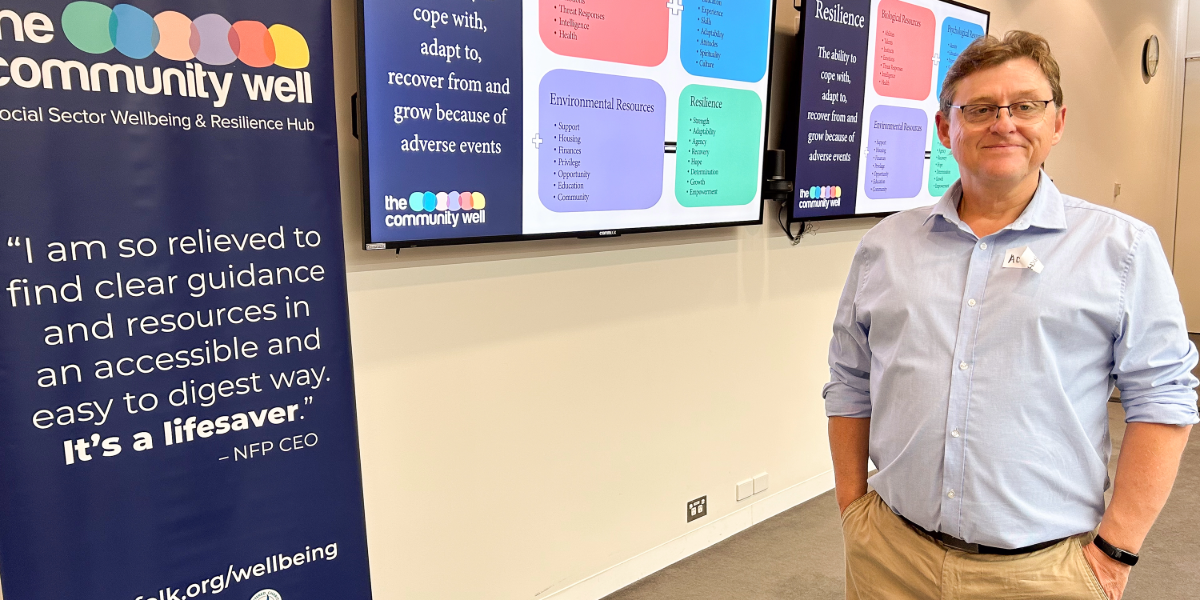Recent natural disasters and the ongoing pressures of the high costs of living mean many staff and volunteers in local not-for-profit organisations (NFPs) and community groups have increasingly become “accidental responders”.
Research shows those in similar positions are experiencing trauma and burnout. Yet most community-led organisations, especially those in regional areas, can’t easily access training to support their people to manage or prevent this ‘helper trauma’.
That’s why, with support from the Australian and NSW Governments, Benefolk Foundation is delivering free mental health and trauma training.
Volunteers and staff will learn strategies to prevent and overcome vicarious trauma (workplace PTSD) and burnout, as well as how to facilitate brief conversational interventions to help prevent and resolve trauma in their clients.
A full-day face-to-face training session will be delivered Friday 2 August 2024, 8:45 am – 4:30 pm AEST at Highlands Hub: 167 Grey St, Glen Innes
Online and self-paced sessions will also be available afterwards to those who register to ensure everyone in local NFPs can access training in their own time.
Individuals working or volunteering in NFPs, community organisations, charities, committees of management, incorporated associations etc are eligible to attend at no cost.
Julia Keady, CEO and Founder of Benefolk Foundation, who experienced the Northern Rivers floods first-hand, says that this training is specifically tailored to support those who have been working so hard to help their communities get back on their feet.
“We ran a similar program last year for 130 organisations across the Northern Rivers, after their tragic flood events. Feedback was that the training increased people’s confidence to continue their critical work, while creating a safe and sustainable working environment. In fact, at the start of the day, fewer than 40% felt confident in responding to trauma in others. This had shifted to 94% feeling either somewhat or very confident after the training.
“A similar shift occurred in terms of maintaining their own psychological safety, so we encourage all local NFP leaders to make time to send their team, especially given the obligations around psycho-social legislation changed in 2023. This means it’s imperative for all NFPs and charities to be on the front foot of staff and volunteer wellbeing in their organisations,” said Ms Keady.
Organisations can also access The Community Well, which has more than 100 free resources tailored to not-for-profit organisations, all focused on enhancing wellbeing.
Adam Blanch, the psychologist who is delivering the training, says that any organisation that has staff working with traumatised people should have a psychological safety plan in place covering prevention, mitigation and recovery.
“Vicarious trauma – or what I call ‘helper trauma’ – doesn’t just affect emergency services personnel, but anyone working with traumatised people, such as those who have been supporting flood-affected communities.
“An important first step is creating a trauma-informed work culture and training staff in preventative measures. This course will provide knowledge and skills towards this goal,” Mr Blanch explained.
Organisations can reserve tickets here: https://events.humanitix.com/gleninnes-nsw-resilient-responders-and-empowering-conversations-one-day-training and learn more about the whole program at www.benefolk.org/central-west-special-project
Some of the comments from people who attended a recent session
- “Fantastic training. Innovative. And a lens that has been missing in our sector.”
- “I have attended various training in trauma and first responder support, however this was the best by far. It should be mandatory for all workplaces, NFPs, sporting groups, volunteer organisations, frontline works. Adam is just amazing. I just wish we could clone him so this message could get out to the whole world.”
- “I’m excited to use the tools provided. Thank you for the functional theory of psychological trauma framework. Thanks for the excellent presentation. It was the best training on trauma I have ever attended.”
- “Absolutely vital training. Events like this are paramount for our sector.”
- “I think all first responders and services industries should undergo this training.”
- “This training has helped me understand where client behaviour may be coming from, and guide me where go from there.”
- “I have a much clearer understanding of the impacts of trauma, how I can respond as a worker to my colleagues and to myself.”
- “Loved each and every moment of it. The session was well curated and very interactive, and engaging.”
Read all the way through to the end of the story? So did lots of other people. Advertise with New England Times to reach New England locals who are interested and engaged. Find out more here.

